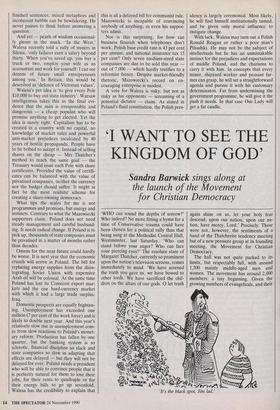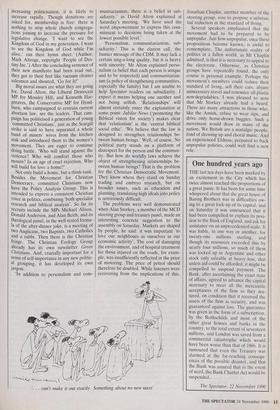'I WANT TO SEE THE KINGDOM OF GOD'
Sandra Barwick sings along at
the launch of the Movement for Christian Democracy
'WHO can sound the depths of sorrow?' Who indeed? No more fitting a hymn for a time of Conservative trauma could have been chosen for a political rally than that being sung at the Methodist Central Hall, Westminster, last Saturday. 'Who can stand before your anger? Who can face your piercing eyes?' The resolute stare of Margaret Thatcher, currently so prominent upon the nation's television screens, comes immediately to mind. 'We have scorned the truth you gave us, we have bowed to other lords. We have sacrificed the chil- dren on the altars of our gods. 0 let truth again shine on us, let your holy fear descend, upon our nation, upon our na- tion, have mercy, Lord.' Precisely. These were not, however, the sentiments of a band of the Thatcherite tendency meeting but of a new pressure group at its founding meeting, the Movement for Christian Democracy.
The hall was not quite packed to its limits, but respectably full, with around 1,500 mainly middle-aged men and women. The movement has around 2,000 members: a tiny beginning. Given the growing numbers of evangelicals, and their T's the black spot, Jim lad.' increasing politicisation, it is likely to increase rapidly. Though donations are asked for, membership is free: there is nothing to stop whole church congrega- tions joining to increase the pressure for legislative change. 'I want to see the Kingdom of God in my generation. I want to see the Kingdom of God while I'm alive,' ran their hymn sheet. (Author, Mark Altroge, copyright 'People of Des- tiny Inc.') After the concluding sentence of their new manifesto had been read out, they got to their feet like vacuum cleaner salesmen and shouted, 'Go for It!'
Big moral issues are what they are going for. David Alton, the Liberal Democrat MP for Mossley Hill, and Kenneth Har- greaves, the Conservative MP for Hynd- burn, who campaigned to restrain current abortion law, are the leaders. That cam- paign has politicised a generation of young 'committed Christians', just as the Scargill strike is said to have separated a whole band of miners' wives from the kitchen sink and introduced them to the women's movement. They are eager to continue doing battle. 'Who will stand against the violence? Who will comfort those who mourn? In an age of cruel rejection, Who will build for love a home?'
Not only build a home, but a think-tank. Besides the Movement for Christian Democracy, committed Christians now have the Policy Analysis Group. This is intended to express a consistent Christian voice in politics, combining 'both specialist research and biblical analysis'. So far its recruits include the MPs Michael Alison, Donald Anderson, and Alan Beith, and its theological panel, in the well-tested formu- la of the after-dinner joke, is a meeting of two Anglicans, two Baptists, two Catholics and a rabbi. Then there is the Christian fringe. The Christian Ecology Group already has its own newsletter Green Christians. And, crucially important for a sense of self-importance in any new politic- al grouping, it has developed its own Jargon.
'In addition to personalism and coin-
munitarianism, there is a belief in sub- sidiarity,' as David Alton explained at Saturday's meeting. 'We have used the word empowerment to express this com- mitment to decisions being taken at the lowest possible level.'
'Personalism, communitarianism, sub- sidiarity.' This is the clarion call, the banner message of the CDM. It may lack a certain sing-a-long quality, but it is heavy with sincerity. Mr Alton explained perso- nalism (a belief that each person is unique and to be respected) and communitarian- ism (a policy of stengthening communities, especially the family) but I am unable to help Spectator readers on subsidiarity. I expect it means helping one another and not being selfish. 'Relationships' will almost certainly enter the explanation at some point: Jubilee News ('promoting the Biblical vision for society') makes clear that `relationism' is the 'central biblical social ethic'. 'We believe that the law is designed to strengthen relationships be- tween human beings.' Well, of course. No political party stands on a platform of disrespect for the person and the commun- ity. But how do worldly laws achieve the object of strengthening relationships be- tween human beings? That is the problem for the Christian Democratic Movement. They know where they stand on Sunday trading and embryo research, but on broader issues, such as education and planning, translating high ideals into policy is notoriously difficult.
The problems were well demonstrated when Alan Storkey, a member of the MCD steering group and treasury panel, made an interesting concrete suggestion to the assembly on Saturday. Markets are shaped by people, he said: it was important 'to love our neighbours as ourselves in our economic activity'. The cost of damaging the environment, and of hospital treatment for those injured on the roads, for exam- ple, was insufficiently reflected in the price of motoring. The price of petrol should therefore be doubled. While listeners were recovering from the implications of this,
. can't make it out exactly. Something about no new taxes'
Jonathan Chaplin, another member of the steering group, rose to propose a substan- tial reduction in the standard of living.
Several speakers emphasised that the movement had to be prepared to be unpopular. Just how unpopular, once these propositions become known, is awful to contemplate. The unfortunate reality of politics in a fallen world, as Mr Chaplin admitted, is that it is necessary to appeal to the electorate. Otherwise, as Christian groups have repeatedly found, the only course is personal example. Perhaps the movement's members could reduce their standard of living, sell their cars, abjure unnecessary travel and renounce all plastic non-degradables. I was pleased to note that Mr Storkey already had a beard. There are many attractions in those who, like the Amish, refuse to wear zips, and drive only horse-drawn buggies. Such a movement would draw in many of the nation. We British are a nostalgic people, fond of dressing up and choral music. And an experienced Eldress, prepared to back unpopular policies, could well find a new role.



































































 Previous page
Previous page